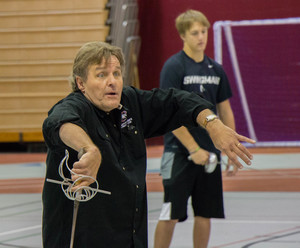Getting to Know: Theatre

College Relations publishes a monthly series of news articles, features and Q&A interviews highlighting various departments on campus in an effort to assist the faculty and staff in gaining an increased awareness about and understanding of each other’s roles and responsibilities.
This month’s Q&A is with Roger Mays, professor of Visual and Performing Arts, and Scott Cavin, associate professor of Visual and Performing Arts.
Q: What career paths do graduates of your program generally pursue?
Some have gone on to graduate schools in theatre. Others have found jobs with Missoula Children’s Theatre, The Post Playhouse, Theatre West, The Rose Theatre in Omaha, and similar regional theatres, touring companies and summer stock theatres. Others work outside the field utilizing the skills developed in theatre such as technical expertise, presentational skills and communication skills. (RM)
Q: How does your department utilize new technology in teaching?
Our biggest improvement in new technologies has been in the digital revolution impacting both lighting and sound. We have equipment and software that enable us to control film, images, sound, and lighting using a remote iPad, as well as lighting control of both color and distribution from a single device. (RM)
Q: What minors are typically recommended for theatre majors?
Language Arts is my personal preference because students get an additional perspective of play scripts as literature as well as dialogue. However, we’ve had many successful students choose Psychology, Human Biology, Marketing, Math, and even Range Management as either a minor or additional major. (RM)
Q: What are unique opportunities are offered students in your program?
Due to our size, students are continually involved in all phases of production including, lighting, set construction, costume construction, stage management and performance. Also, virtually all students are given roles in at least one of the four productions we do annually. This gives them the opportunity to truly apply coursework to their craft and to experience receiving feedback from a public audience as well as instructors. (RM)
Q: What advice would you share with high school students interested in becoming theatre majors?
I would impress upon them what a highly competitive field this is, and the commitment required to make a living from it. However, I would also emphasize the demand for technicians, designers, and lighting experts that continues to grow in the media and the corporate sector. In other words, develop your technical skills as well as performance skills to allow yourself to stay in the field while you await performance opportunities. I’ve worked in theatre for the last 40 years of my life as a performer, designer and technician, and I’ve found all of it both exciting and rewarding. (RM)
Q: What are the most rewarding moments you have had with former CSC students who are now professionals?
Something that is impressive is that our graduates find professional work in theatre. As you can see from the list below CSC theatre students have the ability to work professionally and/or achieve advanced degrees in theatre. Many of our graduates not only pursue a successful career in theatre but also raise families. So, the stereotypical fear of having to choose a family or theatre career is not typical for our students.
That alumni get work in a highly competitive field says a lot about the skills and professionalism of CSC Theatre graduates.
We have had students return to campus to present workshops for Theatre Day and take on guest artist positions. Having current students meet and work with alumni goes a long way to convincing parents that their children have a possible career in Theatre. (SC)
Category: Campus News, Theatre

